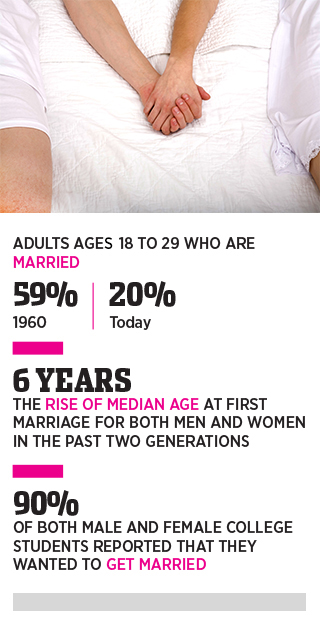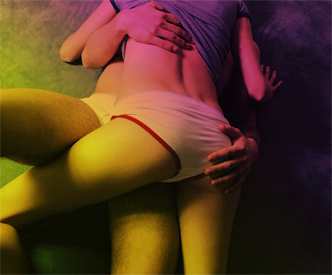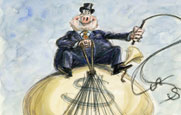Tales From the Millennials' Sexual Revolution
This generation is radically rethinking straight sex and marriage, but at what cost? In Part One of a two-part series, Rolling Stone goes under the covers in search of new approaches to intimacy, commitment and hooking up.
| March 31, 2014
By the end of their dinner at a small Italian restaurant in New York’s West Village, Leah is getting antsy to part ways with her boyfriend Ryan, so that she can go meet up with her boyfriend Jim. It’s not that she means to be rude, it’s just that Jim has been traveling for work, so it’s been a while since she’s seen him. Ryan gets this. As her “primary partner” and the man with whom she lives, he is the recipient of most of Leah’s attention, sexual and otherwise, but he understands her need to seek companionship from other quarters roughly one night a week. Tonight is one of those nights, and soon Leah will head to Jim’s penthouse apartment, where the rest of the evening, she says, will probably entail “hanging out, watching something, having sex.” “She’ll usually spend the night,” Ryan adds nonchalantly, which gives him a chance to enjoy some time alone or even invite another woman over. He doesn’t have a long-standing secondary relationship like Leah (“I’ve actually veered away from doing that”), but he certainly enjoys the company of other women, even sometimes when Leah is home. “I like everyone to meet each other and be friends and stuff,” he explains.
"There was a side of me that was ecstatic – the teenage boy in me that wants to fuck everything I see," reveals Ryan, a millennial in an open relationship. "But the other side of me was concerned about what this means in terms of intimacy and how the dynamics would work."
When Leah and Ryan met at a wedding four years ago, they didn’t expect to develop this type of arrangement. Neither of them had had an open relationship before, though it was something that Leah had contemplated. “I remember the first night, I was telling him about my difficulty with monogamy,” she says. “I don’t know why I felt the need, but it must have been on my mind a lot.” In almost every relationship she’d had, she’d found herself cheating, though she didn’t know if this was a character flaw or a problem with the conventional system. For his part, Ryan was unfazed. “I was just trying to get into your panties,” he says to her, laughing.
Because they started off dating long-distance (Ryan was living in Colorado at the time), it was understood that they would not be exclusive: They initiated a policy Leah describes as “don’t ask, don’t tell.” But when Ryan moved to New York and began living with Leah a year and a half later, he assumed they would transition immediately into monogamy. “I thought, ‘All right, the long-distance shenanigans are over now, we’re moving in together, and it’s time to have a real go at this,’” he says, taking a sip of his beer. He was therefore surprised when the first thing Leah gave him after the move was a book called The Ethical Slut, considered to be a primer on how to handle a non-monogamous relationship.
Certainly, open heterosexual relationships are nothing new. Even the term “open relationship” seems like a throwback, uncomfortably reminiscent of free-love hippies, greasy swingers and a general loucheness so overt as to seem almost kitsch. But Leah and Ryan, 32 and 38, respectively, don’t fit these preconceived ideas. They’re both young professional types. She wears pretty skirts; he wears jeans and trendy glasses. They have a large, downtown apartment with a sweeping view and are possessed of the type of hip hyperawareness that lets them head off any assumptions as to what their arrangement might entail. Moreover, they see themselves as part of a growing trend of folks who do not view monogamy as any type of ideal. “There’s this huge group of younger people that are involved in these things,” says Ryan – an observation that seemed borne out of a monthly event called “Poly Cocktails,” held at an upstairs bar on the Lower East Side a few weeks later, in which one would have been hard-pressed to realize that this wasn’t your run-of-the-mill mixer (a guy who’d wandered in accidentally must have eventually figured it out; he was later seen by the bar grinning widely as he chatted up two women).
In fact, Leah and Ryan are noticing a trend that’s been on the radar of therapists and psychologists for several years now. Termed “The New Monogamy” in the journal Psychotherapy Networker, it’s a type of polyamory in which the goal is to have one long-standing relationship and a willingness to openly acknowledge that the long-standing relationship might not meet each partner’s emotional and sexual needs for all time. Or, more specifically, that going outside the partnership for sex does not necessitate a forfeiture of it. “I was at a practice where we would meet every week, six to eight therapists in a room for teaching purposes and to bring up new things coming into therapy that weren’t there before,” says Lair Torrent, a New York-based marriage and family therapist. One of the things all the therapists had noticed over the past few years was “that couples – and these are younger people, twentysomethings, maybe early thirties – are negotiating what their brand of monogamy can be. They are opening up to having an open relationship, either in totality or for periods of time. I have couples that have closed relationships or open relationships depending on how they feel about the relative health of their relationship. It’s not so dogmatic.”

It’s worth noting that their arrangement was ultimately Leah’s idea. Ryan is a young Generation X’er, while she’s an older Millennial. While both generations were raised by Baby Boomers – who not only initiated the sexual revolution, making acceptable the concept of sex outside the confines of marriage, but who then went on to mostly pair off in traditional marriages – hers was the generation in which the greatest percentage of those partnerships ended in divorce (the divorce rate peaked in the early Eighties, right around the time it’s believed that the Millennial generation began). In other words, Leah’s is a generation that has been raised with the concept of sexual freedom and without solid guidelines for how to make monogamy work. That some brand of non-monogamy would appeal to large numbers of them is thus unsurprising. And in this, Millennials realize that they’re pushing the boundaries of the sexual revolution beyond what their parents might have expected and their grandparents could even conceive. By and large, Leah and Ryan feel comfortable with friends their age knowing that they sleep with other people, but are not as comfortable telling older people (for this reason, and for fear of professional repercussions, they’ve asked me to change their names for this article).
Once Ryan learned that a permanently open relationship was what Leah wanted, he says, “There was a side of me that was ecstatic – the teenage boy in me that wants to fuck everything I see. But the other side of me was concerned about what this means in terms of intimacy and how the dynamics would work. I was very unsure of all that.” Leah, however, forged ahead. “I want to be meaningfully connected and involved with a lot of people, whether or not that means in a sexual way,” she says before taking her leave.

"My friends and I are like sexual vultures," says Kristina, a 20-year-old Syracuse junior. "We just go out and hunt for the guy we’re going to get with."
For Kristina, two boyfriends are exactly two too many. It’s a Friday night in January 2013, the last weekend of the term that sorority girls at Syracuse University can go out until rush season is over, and so it’s pretty much destined to be a rager, especially for Kristina, a 20-year-old junior who jokingly calls herself the “Asian Snooki” because of her impressive ability to throw down. But first, preparations must be made. In a small bedroom in Kristina’s sorority house, her friend Ashley stands in front of a mirror wearing a blue miniskirt and a loose tee, the bagginess of which Kristina eyes skeptically.
“Should I not wear a skirt?” Ashley asks. “Is it too cold?”
Kristina gives her a look. “Um, it’s Friday. It’s skirt day.”
Kristina is wearing long, soft curls, dark crimson lipstick, a black shirt that’s open in the back and a sequiny green miniskirt over bare legs. Her one concession to upstate New York’s brutal winter is a Syracuse sweatshirt that she can quickly jettison as soon as she enters any party. And she plans to enter plenty, beginning with a dorm gathering – where she pre-games with a water bottle full of vodka tonic – before moving on to the rugby house, where the sporty all-American type of guy that Kristina favors should be in abundance.
When she arrived at Syracuse freshman year, Kristina had certain ideas about what her romantic life would entail. “As a freshman, you're like, ‘OK, maybe I'll find my college sweetheart and we'll be together forever and we'll graduate and it'll be perfect,’” she tells me later. But she soon found that “all the frat bros are just douches and that's not what they want,” which led to a period of cynicism before she learned to adapt: “You just learn to become kind of like a frat bro and just go out looking for someone to bang.” Now she doesn’t want to date; she wants to have sex, which thanks to the fact that she is cute and vivacious, she seems to do quite frequently. “My friends and I are like sexual vultures. We just go out and hunt for the guy that we're going to get with. Like, my pheromones are insane right now.” Her current tally of men she’s slept with is 29, though she wouldn’t say she has dated any of them. “I don't want to use the word ‘date,’” she sniffs. “I say, like, ‘We talked.’”

This puts Kristina squarely in the epicenter of “hookup culture,” the idea of which has somehow gotten the very generation that initiated the sexual revolution up in arms. “The really big change in sexual practices among young Americans occurred with the Baby Boomer generation, that is the move toward premarital sex,” says Elizabeth Armstrong, a sociologist at the University of Michigan who studies sexuality. This change was followed by “the move in the Sixties and the Seventies to having sex before a relationship was really fully committed. That big move happened with the parents of the people who are now in college, basically.” And those college kids are now pushing the trend further to today’s standard in which commitment and emotional connection of any sort are both unnecessary precursors to sex. Such a development has been bemoaned as the fall of mankind and lauded as a necessary step forward in the long slog toward gender equality. But what it isn’t is an indication that Millennials as a group are sexual deviants, veering off into a carnal wasteland.
According to results from the National Youth Risk Behavior Survey, the rates of sexual intercourse among high school students decreased between 1991 and 2007, while the rates of condom use increased. The Centers for Disease Control and Prevention report that between 1988 and 2010, the percentage of teenage girls who were sexually active dropped from 37 to 27. And the age at which both men and women lose their virginity is going slightly up, not down (61 percent of Americans have had sex by the time they’re 18). As for college students, a study of a national sample of 1,800 young people who have completed at least one year of college recently found that 59.3 percent of respondents reported that they had sex weekly or more, compared to 65.2 percent of students from an earlier era. Meanwhile, the number who said they’d had more than two sexual partners since turning 18 stayed almost exactly the same. (It’s a matter of conjecture why these numbers are changing, but some sociologists chalk it up to the inherent caution of a generation raised by helicopter parents.)
Nevertheless, while young, straight Millennials may not be having more sex, they are certainly having it differently. The study cited above also found that today’s college students are significantly less likely to report having a regular sexual partner (77.1 percent versus 84.5 percent), while they’re more likely to report having sex casually with a friend or random partner. Having spent a year conducting research on the floor of a freshman dorm at Indiana University, Armstrong has seen this change in action. “As much as I want to try to dispel the fiction that there is this relentless move toward promiscuity, that every single generation is more promiscuous than the last, which just isn't true, I also think that the cultural change – in terms of how people connect, the meanings of these connections, the gendered aspects of the connection, how these connections fit into the rest of their lives – is still changing really fast. It looks like [young people] may be having less sex, less relationships, less commitment, but what they're doing is more casual. We still don't really have a handle on it all.” This does not necessarily mean that the changes are a cause for hand-wringing and tongue-clucking. As Armstrong points out, hookups may be a way of hedging one’s bets for all genders: They allow for physical pleasure while avoiding emotional risks (though there is a gender-based drawback: Women report more sexual satisfaction in relational sex than hookup sex, in part because in the former, oral sex is more likely to be reciprocal).
Which means that Millennials are pioneers in their own right, navigating a wide-open sexual terrain that no previous generation has encountered – one with more opportunity, but also more ambiguity; less sex, but potentially better sex, or at least sex that has the potential to exist as much for its own sake as it does for any other. Ideas of whom one can sleep with and how, and what that means in terms of one’s sexual identity, have never been more fluid. The possibilities have never been so undefined.
For her part, Kristina isn’t even nostalgic for a time when dating roamed the Earth. She is adamant that hookup culture suits her just fine, that she for one doesn’t want a boyfriend right now. She says that while she certainly knows women who in theory do, she doesn’t think many of her friends would prioritize a relationship over other life advancements. “I was actually talking with my sorority about this. Like, if you had a promotion but you had to move across the country, away from your partner, would you stay with your partner or move? Most of us said we'd move. Having a guy hold you back? It's ridiculous.”
Instead, Kristina hopes to graduate and spend a few more years playing the field before getting married. In the process, she says, she hopes she never has to go on an actual date. “I'm obsessed with wedding crap, like I Pin wedding stuff all the time, and I love [celebrity-wedding planner] David Tutera and Say Yes to the Dress. Like, I'm obsessed with the idea of getting married, but I want to skip the dating part and just know who I'm going to marry.” She believes hookup culture might actually make this possible for her generation. “We'll be so experienced in all the people that we don't want, when we find the person who we do want, it's just going to happen.”

"I think modern kids are, for the most part, not going to watch porn and take out of it that donkey-punching is cool in your average first hookup experience," says Jo, the drummer for Austin’s Bright Light Social Hour.
'My generation is coming into their first sexual experience with more knowledge than any other generation,” says Jo, the drummer for Bright Light Social Hour, a kick-ass Southern rock trio out of Austin. He’s with bassist Jack and guitarist Curtis, tucking into some serious barbecue at Rudy’s, a restaurant that is basically a sausage (and rib and brisket) fest inside a Shell gas station not far from the Lake Travis studio where the guys are recording their second album. Over a checkered tablecloth smudged with sauce, Jo, 24, explains that he can’t really remember a time before the Internet. “I mean, I found porn before I even knew how to jack off. That’s how accessible it was. It took me a year or two before I put it together.” By the time he was 18, though, he’d put it together enough to lose his virginity with aplomb. “I feel like porn gave me a very healthy sense of sexuality by making that a part of me at an early age. Conservative people would argue that it would degrade your morals to the point where by the time you’re an adult, you’ll have a warped view of sexuality. I think modern kids are, for the most part, not going to watch porn and take out of it that donkey-punching is cool in your average first hookup experience. Actually, it’s just a good encyclopedia of moves and skills.” He swears that his porn education was valuable enough that the first girl he slept with didn’t believe him when he told her he was a virgin.
As artists in one of the country’s most hang-loose cities, Jack, Jo and Curtis have a particularly enlightened view of sexuality (“I think most girls are more intelligent than that,” says Jack when asked if the women he knows ever feel pressured to perform like porn stars) and a particularly relaxed view of sexual experimentation. “I, like, drunkenly made out with a dude in college once or twice, but I wasn’t into it, I guess. It was more just, like, an experiment for its own sake,” says Curtis, shrugging. Jack grins. “I had the same experience with the same guy.” Sharing rooms on tour, they’ve become immune to watching each other have sex with someone on a neighboring bed. And Jack and Jo once participated in an impromptu orgy at an apartment they shared. “Four guys, four girls,” explains Jack. “It was really laid-back, actually, very natural.” Adds Jo, “Nobody’s [phone] said, ‘Orgy.’”
Despite whatever rock-star-type lifestyle they once enjoyed, all three have now settled down with steady girlfriends. And yet the societal prevalence of sex without emotion has implications even in cases where emotional connection is very much present. Or, as the sociologist Armstrong puts it, “There is a question about whether people who have been doing a lot of hooking up for a lot of years are going to find monogamy such an easy thing to do.”
At 29, Curtis and his girlfriend have the most traditional arrangement. They met at a restaurant where they both worked at the time, happened to break up with people the same week, took advantage of their newfound freedom to sleep together immediately, and then started dating – an order of events he says is very much the norm. “It’s almost in reverse in a sense. It’s like the relationship is the really special and unique part,” while the sex is a step you take to see whether or not you’d want to commit to the relationship. Joe is even more pointed: “It’s more fun to get [sex] out of the way and see how you connect, and then focus on who they are as a human. ‘Are you interesting? Are you fun to be around? Great.’ Sex isn’t inherently a huge step. At the end of the day, it’s a piece of body touching another piece of body – just as existentially meaningless as kissing.”
Jack, 28, met his girlfriend on the online dating site OkCupid, where the preponderance of personal information being shared made him feel like he’d find a better match than he could relying on instinct alone: “Those things that it usually takes months and months to figure out about somebody you know before you go out on the first date.” He’s now been seeing the same woman for four months, a time so uncharacteristically long that he thinks the Internet research must have paid off.
Jo, however, is the one who balks the most at the idea of monogamy. When the guys head back to the studio – up a steep and winding road and past a nude beach called Hippie Hollow – to lay down some psychedelic rhythms, Jo’s girlfriend is there, a pretty slip of a thing with a profound interest in dorking out on synthesizers. Jo is clearly smitten. But he had previously described their relationship as “95 percent monogamous,” an arrangement that he suggested once he realized that he wanted to give things with this woman a real go. “It’s been able to keep me really interested in this particular girl a lot longer than I naturally am in relationships,” he says. “I don’t get the feeling that I’m completely stuck in something.”
Jo also likes knowing that when he returns to his girlfriend, it’s a choice, rather than an obligation. His 95 percent is a psychological level of commitment, rather than an actual statistic. Within the past year, he’s only had sex with someone else “maybe twice, three times,” but it makes him feel more confident in the commitment he’s made knowing that, should the opportunity to sleep with someone else present itself, he can take it. “I’m not out actively trying to get laid. Even on tour, I find myself getting high and watching Adventure Time or mixing music or doing something introverted and nerdy so I can make better music.” Still, “you find someone that’s just so amazing that it would be irresponsible on your life’s trajectory not to [sleep with them], then that’s what the five percent is for. I don’t want to ever feel like I missed out.”

"I knew these girls who would save themselves and be virgins, but they would be total blow-job sluts, like give random guys blow jobs," says Laura, a former sorority sister.
When Laura got married one week shy of her 28th birthday, she was one of the last of her friends to do so, though there was never any chance that she wouldn’t walk down the aisle. A china-doll beauty with a sexy drawl and the type of Southern charm that’s equally at home in cowboy boots and cocktail attire, she’d joined a sorority at the University of Alabama and moved from one monogamous relationship to another, snapped up by the next guy almost as soon as she’d broken up with the last. Still, she says, “I don’t think I went on a real date until I was 25 and in law school. And that doesn’t even really count, because we’d known each other.”
For traditional women like Laura, the expectations of dating – and the subsequent expectations of marriage and family – remained firmly in place, even as the reality proved to be something else entirely. Laura hung out with men at football games, drank with them at bars, sometimes even “shacked up” (her term for spending the night without sleeping with them) and somehow these hangouts would turn into hookups, which would in turn become something more, though there wasn’t ever any clear-cut path to how that might happen. There was certainly never dinner and a movie. Laura’s hopes and romantic aspirations might be just the same as those of her mother, who'd also been in a sorority, but there was suddenly no guidebook, no etiquette, no rules to dictate how those aspirations would be accomplished. When her now-husband asked her out over a text message, Laura was horrified by the lack of formality. She almost turned him down.
Rebecca Wiegand Coale and Jessica Massa, co-founders of the website the Gaggle, have launched a campaign to help women navigate this changing sexual landscape. “We really feel like the first step to embracing the post-dating world and having a great time and finding love within it is just accepting that basic premise that all the rules are off,” says Coale, 30, over salad and wine at a cozy Brooklyn restaurant near where the women once lived as roommates. “There are not so much rules as hints.” This means that a text message at 2 a.m. is probably a sign of a booty call, but one at midnight may not be, that a Facebook friend request could be tantamount to asking for a number, and that a hangout with friends isn’t necessarily a blow-off. This may not make the dating dance any easier, but it does open up a world of possibility in the space between hooking up and traditional dating – an etiquette of social media that has its own code. “Blame our generation for overanalyzing everything,” say 30-year-old Massa, laughing.
A key mission of the Gaggle is to help women realize that having several ambiguous relationships could be as emotionally satisfying as having one certain one – in other words, most women have a whole “gaggle” of men they interact with in different ways, and each of those exchanges could lead to something deeper. “Technology just makes it so there's more people you can interact with all the time,” says Massa. “You have more options and choices, you can be cultivating multiple connections – you know, you can be G-chatting some guy at work, texting with another guy, Snapchatting with someone, hanging out in person, online dating.” Such an approach suits both today’s modes of communication and the temperament of Millennials. In fact, a recently launched website called Grouper allows groups of three friends to set up group blind dates, ensuring that at the very least you’ve got your friends to talk to. “Our generation hates rejection, and I think that we’re quite avoidant of awkwardness and discomfort,” says Massa. The passive ways of reaching out that the Internet allows may come across as ambiguous, but they are ways of reaching out nonetheless, and should be recognized as such. If a workplace coffee leads to a hookup leads to something more: great. If not, it’s good to recognize that any interaction, no matter how undatelike it is, is an iron in the fire.
Of course, things can still get messy once sex is introduced. While Kristina maintained that when it came to sleeping with guys, keeping her “number” down was not really a concern for her and her friends, it certainly is for Laura’s Southern cohort – which only complicates the matter of how and when a hookup buddy might morph into a boyfriend. “I knew these girls who would save themselves and be virgins, but they would be total blow-job sluts, like give random guys blow jobs,” Laura says disdainfully over Skype. “One girl gave a blow job in a fraternity-house shower, which is pretty skanky, but then she’d brag about being a virgin. And it’s kind of like, ‘Well, you've given 10 guys a blow job, but we’ve all had sex with maybe one guy, so thumbs up to you.’” (“The poop hole’s not a loophole,” her husband jumps in to add.) Of course, an indiscretion could be wiped clean if a real relationship ultimately resulted from it. “I think people wanted monogamy to justify their sexual behavior," Laura continues. "It would almost be like, ‘Well, I'm not a slut if he becomes my boyfriend’ type thing.” And not being a slut would improve one’s chances of eventually finding a good mate, which Laura says was on almost every girl’s mind in her sorority.
In 2011, a Pew Research Center analysis of U.S. Census data found that only 51 percent of Americans were married, a record low. While the marriage rate has declined among all age groups, the drop is most dramatic among Millennials: Today, only 20 percent of adults ages 18 to 29 are married (compared with 59 percent in 1960). Meanwhile, the median age for a first marriage has risen by close to six years for both men and women in the past two generations.
Nevertheless, compared to other developed countries, America still boasts high rates of both marriage and divorce – a tug of war between our society’s commitment to commitment and its commitment to individual freedom. And sexual revolution notwithstanding, America is a place where marriage still matters – even among the young. In a recent study conducted by Paula England, a professor of sociology at NYU and president of the American Sociological Association, about 90 percent of both male and female college students reported that they wanted to get married, while a Pew Research Center study from 2010 discovered that a primary goal of the majority of Millennials is to be a good parent.
The question then becomes how to navigate these aspirations in a post-dating landscape. “The hookup culture is a real problem for folks who are trying to transition out of that into something more exclusive,” says therapist Lair Torrent. The Gaggle may be a way of rethinking one’s dating life, but as of right now, no one can predict what the ultimate outcome will be.

"People are addicted to overstimulation," says John, a Silicon Valley start-up founder. "It’s a distraction, a detraction from more real relationships, turning to something more virtual than real."
'I’ve always been passionate about technology, how it improves people’s lives and connects people together,” says a start-up founder, whom I’ll call John, over an iced coffee at Red Rock coffeehouse in Mountain View, California, the global headquarters of Google and the original Silicon Valley town (it’s where the silicon semiconductor was developed). “It’s about creating something impactful and influential.”
When it comes to sex, technology has certainly had its impact and influence, allowing people to connect in ways that would be impossible without it: The Boomers would never have kicked off the sexual revolution without the pill, and Millennials have not only come of age in a time of mass-media sexification, but they’ve also had the Internet to educate, titillate and ultimately connect them with others willing to engage in whatever sexual preference suits them. This means that 10-year-olds are only a mouse click away from images of hardcore porn, but it also means that people are no longer in thrall to the circumscribed sexual “norms” of their social group – a particular boon to gay kids in conservative communities who can use the Internet to tap into an online landscape where their orientation is embraced rather than derided. “I came out in a Facebook letter,” says Jeffrey Hartinger, author of The Generation Y Handbook: Funny Stories About Sex, Dating, and Relationships for Millennials. “I went to a small school, still in the area where I grew up, so I put it out there on my terms.” More broadly, the Internet’s scope and connectivity are allowing sexual niches to conglomerate and, in so doing, are removing the stigma of being niche – and, in some cases, such as online dating, are even turning a niche into a norm. From OkCupid to Chatroulette to Tinder to Grindr to Twine Canvas to Snapchat, the current sexual revolution resides as firmly in code as it does in the bedroom.
Not that any of this necessarily translates into more sex for John, who is slight of build and certainly dorky (he wears socks with sandals and rarely makes eye contact), but who nonetheless has nice features and a pair of adorable dimples: The 25-year-old shyly reveals that he’s never had sex, never been on a date, never even kissed a woman. The Silicon Valley landscape is so dominated by men that he’s had trouble meeting women, much less women who’d want to play around with computer programming, watch sci-fi and have a date of laser tag, which is mostly what does it for John. “I tried to think about what I could do that more women do,” he says bashfully. “At one point, I did yoga for a while.” And there were women in his class he found attractive, but as he says, “It’s hard for me to go deeper than just ‘hi.’” He’s tried Internet dating and Grouper and even Down (formerly Bang With Friends), an app that allows you to tag which of your Facebook friends you’d want to sleep with, and then lets you know if they’ve tagged you, too. So far, John hasn’t received any Down pairings.
To make up for his lack of success with flesh-and-blood women, he says he’s turned to the Internet to fill that gap as well, which has led to what he fears is an addiction to Internet porn that – in the ultimate catch-22 – could hurt his ability to interact with live women sexually should the opportunity arise. “Our bodies are not designed for this level of stimulation,” he says, clasping his hands in his lap and staring straight ahead. “It rewires the brain. I don’t know how it was before, but I would probably say it makes [sex] less special, and what I would want to do would have it be more special.” He takes a long pause. “It’s a bit much.” (As it happens, Internet addiction may be both a cause and an effect of the fact that the number of virgins is on the rise: In a 2011 government study of 5,300 young people ages 15 to 24, the proportion who said they’d never had sex of any kind – oral, vaginal or anal – rose from 22 to 28 percent in the past decade.)
In order to break what he considers to be an unhealthy cycle, John found an Internet solution in an online community known as NoFap. “It’s a movement of people who are essentially abstaining from porn and masturbation,” John explains. “Fap” being an onomatopoeic term meant to imply jerking off, NoFap adherents congregate on Reddit and tally up the days they’ve been able to go without resorting to Internet-abetted self-pleasure, the idea being to allow the body to reset to a time of more sexual innocence. John is currently at 15 days and counting. “It’s kind of game-ified, I guess.”
Ultimately, he hopes his abstentions will pay off in a more healthy approach to sex and therefore a better chance to forge a commitment with someone offline. “People are addicted to overstimulation,” he says. “It’s a distraction, a detraction from more real relationships, turning to something more virtual than real.”

"What I realized that day is, I am actually very comfortable having sex with other people watching, and I actually enjoy that," says Leah, after visiting a Vegas sex club with her boyfriend Ryan.
Leah and Ryan eased into their open relationship one stage at a time, starting with a visit to a sex club in Vegas six months after they’d moved in together. “We needed to blow off some steam and had been talking about doing something crazy like this for a long time,” Ryan explains. “It was written up in Yelp or something.” Before going, they discussed what their rules would be: They would possibly have sex with each other, but certainly not with anyone else. When they arrived, though, the place was seedier than expected, a dank nightclub with a maze of little nooks and crannies with mattresses where the action could go down. “We almost didn’t go in, but we were like, ‘What the hell?’” says Ryan. Leah nods. “I was very nervous about it.” And they might have just left if it weren’t for meeting another young couple that seemed even more at sea than they were. “The woman started saying, ‘Well, my fantasy is to watch another couple have sex,’ so Leah and I looked at each other and were like, ‘OK,’” says Ryan, who had taken a Viagra just in case performance anxiety set in. “We started making out and having sex in front of this other couple, and I was really excited by it.”
The sex was really a turning point for Leah: “What I realized that day and since then is that I am actually very comfortable having sex with other people watching, and I actually enjoy that.” In fact, the experience was so pleasurable that when they got back to New York, they transitioned from letting people watch them have sex to having threesomes (here, the Internet really helped in terms of finding both potential partners and sex parties). Eventually, this transitioned into having sex with other people. “It’s actually something that enhances our excitement with one another,” says Leah, now strolling through a lamp-lit Washington Square Park before going to meet Jim for the night. She firmly believes that having the contrast of sexual experiences allows her to appreciate Ryan more. And he agrees. “When Leah has a new experience, or I do,” he says, “the two of us together will then just have great, passionate sex.” Now, neither can imagine going back to a monogamous arrangement, in this relationship or any other.
Not that they plan to be with anyone else: In their future, they see a family, kids to raise, a marriage, maybe a mortgage – all the traditional trappings of American domesticity – and they want to share those things primarily, if not exclusively, with each other. “I want to get married,” Leah had said over dinner, looking at Ryan expectantly. “It’s become more important for me, because I think it would be a gesture of our current commitment to one another, given that we’re living in a pretty unconventional way.”
This story is the first of a two-part series exploring Millennials' sexuality. In Part Two, Rolling Stone will take a close look at the lives of queer Millennials.









